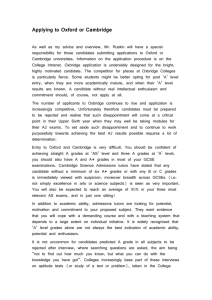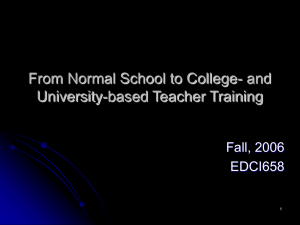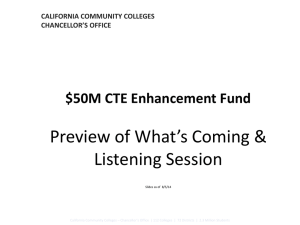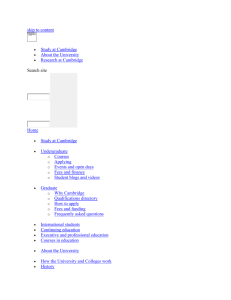Making a Competitive Cambridge Application
advertisement
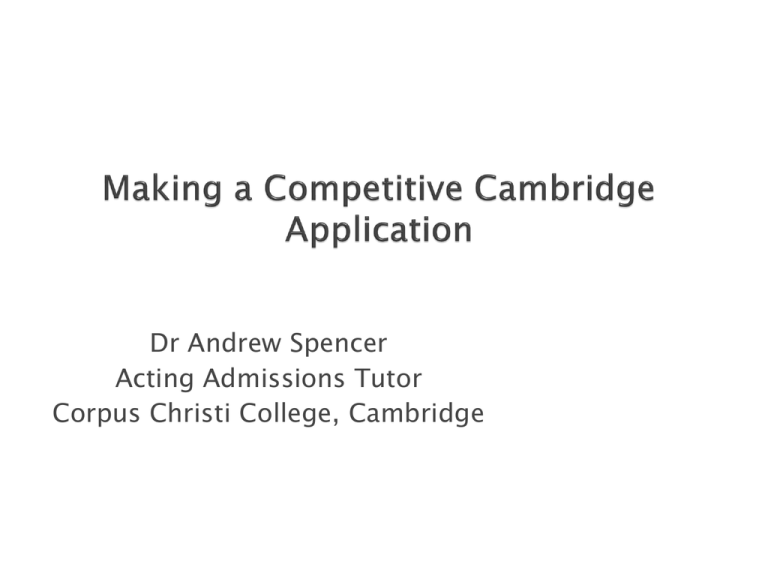
Dr Andrew Spencer Acting Admissions Tutor Corpus Christi College, Cambridge 29 Undergraduate Colleges Focus of your life at Cambridge ◦ meals and accommodation ◦ supervisions ◦ social life: sports and societies ◦ academic and pastoral care 20% of successful applicants are made offers by a different College to the one to which they originally applied Open Applications: competitive applicants have equal chance of success Colleges have more in common than they have differences Most important decision (more important than which university) Careful consideration of content of degree No joint honours degrees Assessment Choose course and College UCAS application (Extenuating Circumstances form) Result of applicatio n Choose ‘firm’ and ‘insurance’ choices Submit by 15 October Interview (mid December) Exam results/ confirmation Complete online SAQ Written work/ tests Start universit y Admissions decisions are based on: A level (or equivalent) grades and subject combinations AS grades and unit marks GCSE grades School/college reference Personal statement Submitted work (where requested) Test results (where applicable) Interview performance Unlike Oxford testing is not a significant part of selecting whom we interview •Pre-interview tests in Medicine and Veterinary medicine (BMAT). Some colleges will ask for TSA in some subjects (check university website). •BUT we do use tests at the time of interview as part of the selection process. •Some of these are university-wide tests (Cambridge Law Test, Philosophy Logic Test), while colleges often use tests in particular subjects (again, check the university website to see what colleges ask for) • c.70-80 per cent of candidates are interviewed. Decisions about interviewing usually made on the basis of AS UMS performance. Usually all on one day in early December. Usually all in one college. Candidate usually have two interview (sometimes three) and it is usual for there to be two academics in each interview. Interviews last between 20 and 45 minutes, most frequently 25-30 minutes. • Conducted by subject specialists • Problem-solving scenarios and discussion • Interactive tests of: Interest Aptitude Core knowledge and technical skills ‘Teachability’ Some colleges are oversubscribed in particular subjects in particular years, others are undersubscribed – the Pool helps to ensure that strong candidates do not miss out Data sharing between colleges before, during and after interview period. Colleges make one of three decisions about each application: 1) Direct offer; 2) rejection; 3) Pool Pool takes place in early January and allows colleges with spaces to fill up their places. Three possible outcomes for candidates in the Pool: 1) Direct offer from a new college (BUT sometimes from original college); 2) interview at another college/s; 3) no offer and therefore unsuccessful application. Students who: • • • • • Can most benefit from what we have to offer, whatever their background Enjoy a challenge and are academically highly able Have a sound knowledge base and a range of skills, with the potential to go beyond the syllabus and use this knowledge in unfamiliar situations Have wider engagement in the subject, expressed through an interest in new ideas and an enthusiasm for ‘reading’ round the subject Have self-discipline, selfmotivation and commitment Usual offers at Cambridge For Science course (Computer Science, Engineering, Maths, Medicine, Natural Sciences and Veterinary Medicine) A*A*A at A level For all other courses A*AA at A Level 40-42 points, incl bonus, in IB and 776 in Higher Level papers Also accept applicants with range of other qualifications STEP for Mathematics (typically, grade 1 and 1 in STEP II and III) Extended Projects are not included in offers Occasional variation in offers in particular circumstances Christ’s College - Arts & Humanities AS ave (2012 entry): 93.62 per cent. Sciences AS ave (2012 entry): 94.71 per cent. Christ’s College – Arts & Humanities (2012 entry) achieved average of 2.3 A*s. Science (2012 entry) achieved an average of 3.46 A*s.



